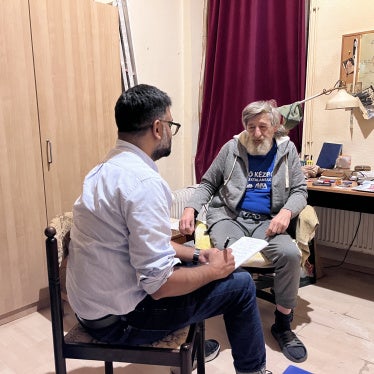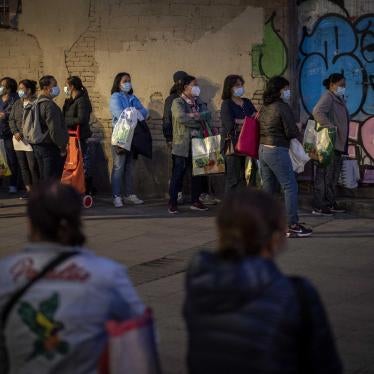The World Bank will be implicated in the human suffering in Chechnya if it releases the next installment of a major loan to Russia.
In a letter to World Bank President James Wolfensohn, Human Rights Watch called on the Bank to withhold a pending $100 million payment under a structural adjustment loan to the Russian Federation. Describing indiscriminate and disproportionate bombing, looting, and extrajudicial executions committed by Russian forces in Chechnya, the letter states that if the Bank made the payment to the Russian Central Bank for general budgetary spending, it would be implicated in these abuses.
"The bank shouldn't finance the abusive and destructive conduct we are seeing in Chechnya," said Kenneth Roth, executive director of Human Rights Watch. "Russia's campaign in Chechnya violates international law and undermines development, and the Bank should have no part of it."
Roth said Human Rights Watch was equally concerned about another $100 million pending for payment from the Japanese government, as well as the prospect of private financing for Russia's campaign.
The International Monetary Fund recently delayed payment of $640 million to Russia. Officially, the decision was based on economic factors, but widely believed to be linked to the Chechnya conflict. In the wake of the IMF decision, news sources reported the Russian government was considering alternative funding sources, including a bond issue targeting foreign investors.
A copy of the letter from Human Rights Watch to World Bank President James Wolfensohn is attached.
--------------------------------------------------------------------------------
December 14, 1999
OPEN LETTER
Mr. James Wolfensohn
President
The World Bank
1818 H Street, NW
Washington, DC 20433
Re: Structural Adjustment Loan Disbursement to Russia in Light of Conduct of Russian Forces in Chechnya
Dear Mr. Wolfensohn:
We are writing to you with the utmost urgency to ask you to withhold payment of the forthcoming $100 million disbursement under the Bank's structural adjustment loan to the Russian Federation, and to use your relationship with representatives of the Russian government to press for an end to the abuses being committed in Chechnya, making clear that any future disbursements will be linked to the Russian government's compliance with its international commitments in its conduct in Chechnya.
We understand of course that the Bank is constrained by its Articles of Agreement, as well as its loan agreement with the Russian Federation. As is elaborated below, however, we cannot accept that these restrictions could be read to require the Bank to finance a government engaged in activities that so clearly violate international law and undermine the Bank's fundamental development goals as is currently the case in Russia.
We have welcomed your leadership in recent years in guiding the Bank toward full appreciation of the important "human aspects" of development. You spoke forcefully at this year's annual meeting, envisioning a world, which the Bank can help create, where everyone might say, "Today, I fear no one.'" Unfortunately, this is far from the case in Chechnya, where tens of thousands of civilians are cowering in the basements of Grozny. They are facing the Russian forces' ultimatum that they leave the city or face imminent "destruction" together with Chechen rebels, yet they have not been able to flee due to on-going aerial bombardment and limited means of transportation. The current lull in the shelling has allowed some Grozny residents to flee to safety. However, hanging in the balance is the fate of those who remain and may be unable to leave due to their personal circumstances --- the elderly, the infirm, and the poor.
The Russian government maintains that it is conducting an "anti-terrorist" operation in Chechnya, prompted by the terrorist bombings in Moscow and Volgodonsk, and incursions by Chechen militants into Dagestan. Of course, the aspiration of fearing no one belongs to Russian citizens of Moscow, Volgodonsk and Dagestan, as well as those of Chechnya. No one doubts the right, and indeed responsibility, of the Russian government to protect its citizens from terrorism. But the actions of Russian forces in Chechnya have gone far beyond anti-terrorist measures and have had a severe impact on the civilian population of Chechnya. Russia is today a party to an internal armed conflict, and must observe its obligations under the Geneva Conventions and other international humanitarian law that regulates such conflicts. To date, in Chechnya, Russian forces have flouted these standards.
Human Rights Watch researchers in the northern Caucasus have interviewed hundreds of civilians fleeing Chechnya. Our findings confirm that the conduct of Russia's military campaign in Chechnya continues to take a terrible toll on civilians. Russian forces have bombed and shelled dozens of towns and villages still inhabited by civilians, actions that have killed and maimed untold numbers of people and shown contempt for international humanitarian law. They have consistently failed to provide civilians safe exit routes out of the conflict zones, forcing them either to remain in villages under siege or risk getting shot on the road. Civilians able to reach the border crossings often face long waits, sometimes up to days, in freezing weather while Russian border police "process" them and extort bribes as a condition for permitting them to cross. Displaced persons in Ingushetia face serious protection problems and acute, sometimes life-threatening, lack of basic humanitarian assistance.
Soldiers in Russian-controlled areas of Chechnya apparently have carte blanche to strip homes of household goods and valuables; many people have returned briefly to their homes to find them looted bare. In the village of Alkan-Yurt, Russian forces went on a rampage, killing several of the homeowners who resisted the looting and burning some homes in the village after looting them. The testimony of displaced persons from the town summarized in the attached statement indicates that at least twenty-three persons, and possibly many more, were summarily executed in the town between December 1-9, 1999. The Russian military authorities appear to have little interest in stopping abuses by their forces, and have allowed a culture of impunity to develop in Chechnya.
If the Bank pays the forthcoming installment on its structural adjustment loan, it will be implicated in this human suffering and held accountable by citizens of the world who are in fact its ultimate shareholders. As a direct payment to the Russian Central Bank for purposes of general budgetary spending, there is a clear danger that World Bank funds will fuel the military engine at work in Chechnya. Even were there agreed restrictions imposed on the use of Bank funds in order to safeguard against such allocation, the Bank would nonetheless be complicit in abuses in Chechnya, as its support would free up other Russian government resources to fund the war effort. For this reason alone, the Bank must refuse payment on the loan.
Moreover, the Bank should withhold payment and press the Russian government to cease the violations in Chechnya, because they only serve to exacerbate the already considerable development challenges facing the country. As you have frequently recognized, achieving sustainable economic development is only more complicated and difficult in a post-conflict situation. The current conflict in Chechnya is at least in part a function of the failure of post-conflict reconstruction in the province following the 1994-96 war. As the current Russian assault escalates, the prospective cost of physically rebuilding Chechnya, not to mention creating credible and effective governmental structures capable of assuring good governance and security to its citizens, mounts to staggering proportions.
Finally, the Bank should take a stand against the Russian government's actions in Chechnya, because they violate international humanitarian law and reflect a broader disrespect for Russia's international commitments. A government should not be considered a reliable investment partner if it undertakes specific commitments and then blatantly abrogates them, as the Russian government has done at the OSCE summit in Istanbul and in subsequent weeks, with respect to the promised visit of the Chairman-in-office to Chechnya and the role of the OSCE Assistance Group. There is a global system of international law that encompasses the Geneva Conventions and other humanitarian norms as well as international financial agreements; the Russian Federation should not be allowed to pick and choose among its commitments.
The Bank's Articles of Agreement and its loan agreement with Russia must be interpreted in the context of this broader international legal framework. Given the Bank's origins and purposes, there must be an implied understanding in any Bank undertaking that it cannot be allowed through its financing to become complicit in the kinds of violations of international law being perpetrated by Russian armed forces in Chechnya, nor for that matter, to underwrite conduct that is so contrary to its fundamental development goals. Put another way, the Bank is required to weigh only "economic considerations," but it is further required to do so in a manner consistent with its core purpose.
Much has been made of the risk of alienating the Russian government from western institutions if a strong stand is taken against the violence in Chechnya. As we emphasized at the outset, however, a stand can be taken against the methods used in Chechnya, without objecting to the legitimate and politically popular goal of eliminating the scourge of terrorism.
Moreover, allow us to observe in closing that the Russian misperception that they are being treated unfairly by the international community is only likely to be worsened by obvious obfuscation such as that undertaken recently by the IMF, which withheld funds for one set of stated reasons when everyone including the Russian people knows well that it is another. The more credible and effective course is to clearly articulate the real conditions for continued financial support, which should in this case be a clear and verifiable commitment on the part of the Russian government to abide by international law in Chechnya, specifically desisting from attacks on heavily populated areas; implementing well-publicized cease-fires along exit routes to allow civilians to flee; and allowing unfettered access and necessary security for international observers and that of humanitarian organizations seeking to provide relief in Chechnya.
Thank you for your attention to these urgent concerns. Please do not hesitate to contact us if you have any questions.
Sincerely,
Kenneth Roth
Executive Director
Holly Cartner
Executive Director, Europe & Central Asia Division
enclosure: Human Rights Watch Press Release: "Russian Troops Rampage in Chechnya Village."







